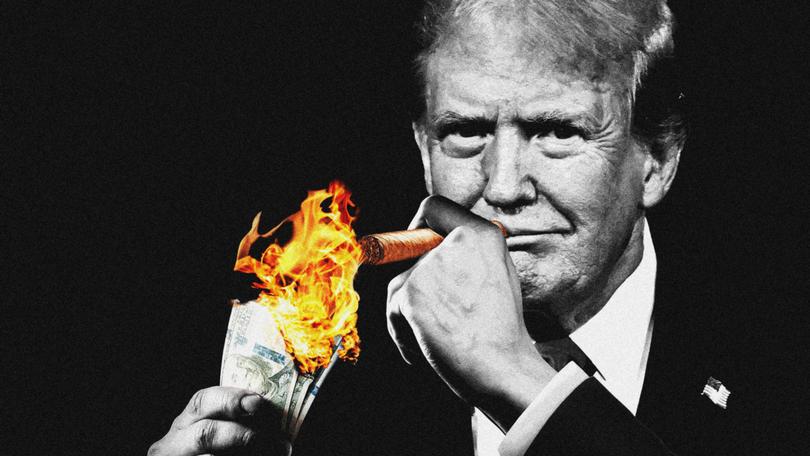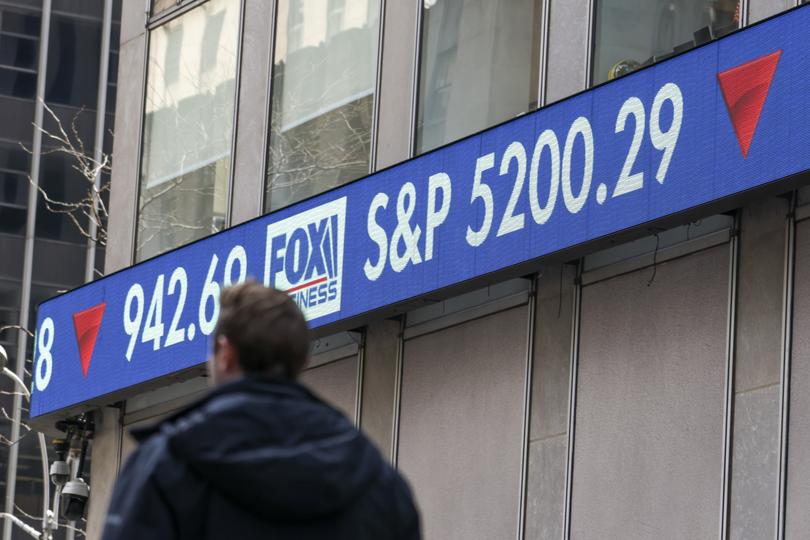JACKSON HEWETT: Trump trade war escalates with warning signs flashing red amid bond carnage
JACKSON HEWETT: The trade war reached terrifying new heights overnight with investors in Australia’s $2.5 trillion bond market now contemplating the prospect of a grim new financial crisis.

Overnight escalation in the trade war between the US and China has sent the Australian bond market into panic.
Trade has completely frozen in the $2.5 trillion market in Australia as investors contemplate the prospect of a new financial crisis caused by the trade war.
“Even if wanted to sell bonds as solid as BHP’s, there’s no one willing to make a bid,” said Christian Baylis, chief investment officer at Fortlake Asset Management and a former economist at the Reserve Bank of Australia. “We’re back to the mass bed-wetting of two days ago.”
Sign up to The Nightly's newsletters.
Get the first look at the digital newspaper, curated daily stories and breaking headlines delivered to your inbox.
By continuing you agree to our Terms and Privacy Policy.The bond market is far more important to domestic and global finance than equities — it directly determines the rate of interest companies pay for borrowing.
It was a “subprime” bond market failure that sparked the Global Financial Crisis, while the prospect of unfunded tax cuts sent UK bond investors scrambling for the exits, ultimately ending the career of Prime Minister Liz Truss.
Donald Trump’s recent u-turn on tariffs — offering a 90-day pause — was a reaction to a huge selloff on US bonds on 9 April.
Investors had hoped Mr Trump had learned his lesson and would let adults like former bond trader turned Treasury Secretary Scott Bessent take the wheel more.
But the imposition of another round on tarrifs on China - now up to 145 per cent from a starting point of 34 per cent less than a week ago — and Beijing’s continued resistance has restarted the bond market’s fear gauge.
Bond managers are now trapped in what Baylis calls a “Mexican standoff”, with no real bids in the market, only insultingly low offers. Even the highest quality debt is effectively unsellable.
“If I went to sell CBA bonds today, there might be one or two bids, but they’d be fake — like someone offering $200,000 for your house,” Baylis said. “It’s just ridiculous.”
So far, the market isn’t selling at firesale prices, but if investors start to panic and call back their deposits from bond funds, that is when the blood might start hitting the streets.
At that point, the equity selloff we have seen so far, with markets down more than 12 per cent since tariffs were first raised, could get a lot worse.
As one experienced trader, who asked not to be named, said: “A disorderly bond market is not good for equities. It is a sign the system is breaking.”
The warning comes as the stock market shed another 2.5 per cent at the open, following a plunge on Wall Street overnight that saw the S&P500 fall 3.46 per cent and the tech-led Nasdaq lose 4.31 per cent. In early trade, Japan’s Nikkei was down nearly 5 per cent.
Last night’s falls came during a whipsawing week where Trump’s tariff pause sent US shares skyrocketing on their biggest individual day since 2008, when the US Federal Reserve enacted emergency measures to slow down the GFC.
Investors, whether in equities or bonds, now face an agonising 90-day wait to see what policy comes next — and even then, they cannot be sure if it sticks.

“No one knows what to do for the next 90 days, because you just can’t trust Trump no matter what he says,” Baylis said. “One minute he says X, the next minute he says Y. It’s just impossible to actually understand the logical or try to predict what he’s going to do.”
In the post-tariff equity selloff, investors have been pouring into the safe haven of bonds but they are becoming increasingly choosy. Anything that is not of the highest quality will need to pay a higher return to justify the risk of holding it. A risk that just got much higher as a result of this trade war.
Even State government bonds have not been spared, with the spread - the value between what interest a bond is paying against its bond rating benchmark - widening.
“Even New South Wales government bonds are puking five and six basis points. That’s quite significant,” Mr Baylis said.
“What that tells you is banks are full to the gills, and will only prioritise the highest quality bonds. If you’ve got anything to do with risky bonds, you’re in a very sticky situation.”
For companies who have issued riskier, lower rated bonds they will start seeing their interest rates rise, meaning the weakest companies now face even higher borrowing costs.
In Australia, that’s dangerous enough at at time when insolvencies are at record highs. In America, such companies will also be contending with the impact of trying to sell China-sourced products that are now 145 per cent more expensive.
“The million dollar question is, when do a lot of these high yield-paying, poorer quality corporates start to hit the skids and really feel it,” Mr Baylis said.
“All of that uncertainty can just tip some of these companies that are teetering over. That’s what Trump’s tariffs can do. Everyone’s on the lookout because you just don’t know what’s going to wash up in this sort of tariff war.”
As some of the riskier bonds become toxic and avoided by investors, spreads — there’s that word again for the gap between a bond’s payout and what it should be paying according to its rating — start to widen further.
Viktor Shvets, Macquarie Group’s global strategist, said if spreads widen too much, the global economy “freezes.”
“If the policies are not changed, then the risk (of a trade war) is nowhere near priced. If the high yield triple-C (rated bonds), which are now 10, 11 per cent spreads, go up to 15, the world will freeze. If the average spreads, which are now a lot more like 4.5 (per cent), go to 6, both the global economy and the US economy will freeze,” Mr Shvets told Bloomberg’s Odd Lots podcast.
If President Trump and President Xi can’t find a way through the trade impasse, the world faces the prospect of another global financial crisis — but one where the once-sacrosanct US dollar, and the core asset underlying it — US Treasuries — will no longer act as a stabilising force.
At the height of the multilateral system, US Treasuries were owned in the trillions by foreign governments as well as investors.
Faith in US assets kept the wheels of finance turning. But China is jettisoning US Treasuries, fearful that it gives America leverage.
Japan is rumoured to be selling out too, as part of its tariff negotiations.
If the exit of major governmental purchasers punctures faith in Treasuries as the core pillar of the financial system, and the bond markets’ fears turn into a full-blown crisis, there won’t be many places to hide.
That is why the US dollar continues to drop, gold continues to soar past record levels, and why everybody is hoping the tariff madness comes to an end.

